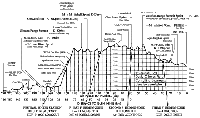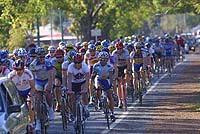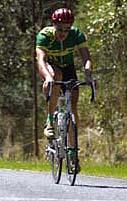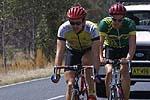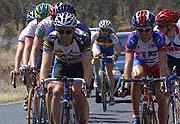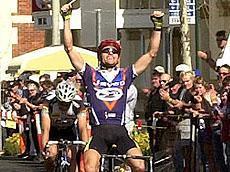Live Report for September 14, 2001Grafton to Inverell Cycling Classic - NENSW, Australia, September 15, 2001Report produced by Gerard Knapp 8.00am: Grafton - 228km to race
Welcome to the Cyclingnews coverage of one of Australia's premier single day races, the Grafton to Inverell Cycling Classic. Set in northern New South Wales on the east coast of Australia, this race starts from the coast and heads inland, scaling three sharp climbs before it hits the main obstacle, the 17km long climb up the Great Dividing Range to the summit at the Gibraltar Range. From the top of the range, the riders will then continue to climb until they reach an altitude of 1190 metres before a slight descent into Glen Innes. After Glenn Innes, the course winds down into Inverell, which is at just over 500 metres altitude. The race is rarely flat, with many sharp climbs and opportunities to attack. This morning the riders from five divisions have assembled in the main centre of the country town of Grafton and after an evening storm, they have a beautiful day for racing ahead of them, reports race director Peter Sunderland (a former winner of B grade in this race and brother of Belgium-based Australian professional, and Inverell local, Scott Sunderland).
As the peloton headed out of Grafton along the jacaranda tree-lined road, there was a 170 rider-strong peloton, one of the largest fields ever assembled for a road race in Australia. Some of the favourites in the A grade division include David Mckenzie, a former stage winner of the Giro d'Italia and subject of recent discussion on the Cyclingnews letters pages, as he looks for a pro contract for next year. Earlier this year, Mckenzie was one of the riders left stranded by the ill-fated Linda McCartney Racing Team, which folded in dramatic circumstances earlier this year. Another rider expected to do well is Peter Milostic from Penrith Panthers, currently leading the Australian National road series on points. Also look for the re-entry of another ex-LMRT rider in Ben Brooks, a promising young Australian rider who was also left out in the wilderness by the failure of the British team. The amalgamation of the grades, which includes A, B, C, womens and veterans, is to reduce the cost of paying for support from the NSW Police Department. Support for road racing in Australia is hard to obtain. Also hard to obtain is communications as the race heads inland and away from the more densely populated coastline. Peter Sunderland will be using a satellite telephone to provide the updates to Cyclingnews. 8.36am: 207km to go - early attack Just after the neutral stage ended, a quality group of eight A grade riders went clear, including a former junior World Track Champion in Peter Dawson, as well Scott Bradburn, Paul MacDonald, Matt Smithson, Ian Garrity, John Baxter, John Forrest and Ian Walker from B grade. Significantly, this group does not contain any of the pre-race favourites, such as David Mackenzie, the former stage winner of the Giro d'Italia and Linda Macartney Racing Team rider. 9.06am: 188km to go - Jackadgery Gap KOM The first severe obstacle of the race is the Jackadgery Gap KOM, a 10.1% climb which softens up legs and opens up the lungs first thing in the morning. First over the Gap was Scott Bradburn, followed by Matt Smithson and then Peter Dawson. By the top of the climb, this break was still together and had pulled out a lead of 3.15 over the peloton. 9.20am: 180km to go - Mann River Sprint As the break crossed the bridge for the Mann River sprint, it was Matt Smithson who took the honours, followed by Scott Bradburn, the Ian Garrity and Peter Dawson, seemingly saving his legs, given his background on the track and as a former national criterium champion of Australia. 9.40am: 170km to go - Cangai Creek The break of eight has extended its lead to 7.30 with 10 kilometres before the start of the climb. Peter Sunderland reports that the peloton has seemingly sat up, although some serious chasing could commence on the climb. Of the riders in the break, Scott Bradburn is a noted climber and rode well in last year's race, however, other riders such Ian Garrity are not that strong on the climbs and better suited to to the rolling country which comes after the riders scale the highest point when there is still over 90 kilometres to the finish. 10.50am: 142km to go - Gibraltar Range KOM
Scott Bradburn was alone as he crossed the line for the Gibraltar Range King of the Mountains sprint, with a one minute lead over John Baker and Peter Dawson in third. The remaining five riders of the break came across in one's and two's spread over four minutes, while the main field was a whopping 12 minutes behind the leaders at the bottom of the climb. On the climb, however, the peloton has started to seriously fragment
as the stronger riders put the hammer down and attempt to make up some
time on the leaders, who have a good buffer and the numbers to cause
an upset. There has been a major split in the lead group of eight, with Scott Bradburn and John Baker pulling out a four minute lead over Peter Dawson and B grader Ian Walker, while the other four in the original break have dropped back to the lead group of the main field, which is comprised of 28 riders about eight minutes behind. The lead group of the peloton pulled back four minutes on the Gibraltar Range climb, working away on the 12 minute deficit when they first aproached the bottom of the main climb. At the Softwood Hill KOM sprint, Scott Bradburn took the top points, with John Baker in second, and this was how they both went accross the line at the Mt Mitchell sprint with 107km to go to Inverell. Peter Sunderland believes that a four minute lead for only two riders, with over 100km of racing to go, may not be enough for a win, but it depends on how well the chasing group works together. 12.45pm: 68km to go - Glen Innes sprint
There had been a major change to the race by the time of the sprint at Glenn Innes, with the two leaders - Scott Bradburn and John Baker - being caught by a chasing group of 15 who had earlier rounded up Peter Dawson and Ian Walker. This leading group of 17 riders contains all the main favourites and the sprint at Glenn Innes was won by Glenn Stojanow with David Pell in second and once again, Scott Bradburn winning some more points by taking third. The leading group of 17 is being chased by another group of 11, which trails by one and a half minutes. The lead group includes Peter Milostic, Pell, David Mckenzie, John Baker, Rhys Pollock, Cameron Hughes, Tony Mann, Stephen Blackburn, James Taylor, Stojanow, Peter Dawson, Brett Lancaster, Joshua Hudson, Scott Bradburn, Ashley Humbert, Caleb Manion and B grader Brendan Howard from Coffs Harbour. 1.15pm: 52km to go - Matheson sprint The chasing group of 11 riders, made up of A and B graders, had actually caught the leading bunch of 17 by the time they hit the bottom of the Waterloo Range with 58km to go. However, once they tacked on, the stronger riders put the hammer down on the climb and this group of 28 was very short lived, with many riders being spat out the back as they climbed the 8.1% climb up to 1155 metres. The Waterloo Range KOM sprint was won by David Mckenzie, with the ever-present Scott Bradburn taking second and Ashley Humbert in third. This is the first - and probably not the last - time Mckenzie has hit the front for this race. On the steep descent into Matheson, former Olympian and track specialist Brett Lancaster and Tony Mann had jumped off the front and held a 20 second lead over the main group of now 13 riders, after the selection was made on the Waterloo Range climb. Lancaster took the Matheson town sprint, with Mann in second. It seems inevitable the chasing group of 13, containing Mckenzie, Milostic, Pell, etc, will catch these two. A stand-out performance is being put in by B grader Tony Brindel, who is in this chasing group of A grade riders. 1.32pm - 35km to go Brett Lancaster and Tony Mann have extended their lead over the chasers, and now have 45 seconds. Peter Sunderland reports the chasing group is not really organised, while Lancaster and Mann are working well. There is about 12 km before they hit Wire Gully, a short and sharp climb only 20 km from the end of the race, the scene of many selections in previous races. If the two attackers can hold off the chasers and get over Wire Gully together, then they face a mainly downhill run into Inverell, with only a slight five kilometre drag to slow them. 2.00pm - 18km to go - Wire Gully KOM sprint
The final selection - Wire Gully has played its role in this year's Grafton with a group of four going clear. Earlier, the chasing group caught Lancaster and Mann before the climb. As the field hit the short climb, the stronger riders attacked and the KOM sprint was won by David Mckenzie, with Ashley Humbert in second, Peter Milostic and then David Pell. These four have a 20 second lead on the remaining riders of the first group and have the quality riders to stay away - if they work together. 2.10pm - 10km to go The leading group of four have built up a 50 second lead on the chasing bunch. If it comes down to sprint - which appears likely - then watch for Mckenzie. 2.12pm - 5km to go At the end of a slight drag for the last five kilometres, the constant attacking by Mckenzie, Pell and Milostic had managed to leave Ahsley Humbert behind. Now, with five to go, the three strongest riders are playing a constant game of attack and chase. 2.22.40 - finish line at Inverell The three leaders have been constantly attacking each from one side of the road to the other, but on the gradual descent into Inverell and with only a slight cross-tailwind, no rider can go clear, although Mckenzie and Pell are looking very strong. As the trio approach the main centre of Inverell, they come around the very last obstacle - a roundabout which is quite often the place for an opportunist attack - with less than one kilometre to the line. The three of them come through the roundabout in single file and then Pell takes the initiative and attacks, with the finish line only 400 metres away. But it's too long a sprint for Pell and Mckenzie immediately grabs his wheel and sits on. Mckenzie then swings up the inside of Pell along the left hand side of the road and skirts the barriers and Milsotic follows. However, Mckenzie's sprint is too strong for the chasing Milostic, and the former Giro stage winner hits the line over two bike lengths clear of Milostic in a victory salute, with Pell taking third. Forty seconds later Ashley Humbert finishes to get fourth, with the first of the chasers still over two minutes behind.
After the win, David Mckenzie told Cyclingnews that he had really wanted this win, after coming to second in 1999 to Jamie Drew, now racing with Mercury in the US. "It's too far to drive to go home with a second," the Victorian rider tells Peter Sunderland. 2.26.53 - finish line at Inverell The remaining riders in the lead group of 15 which formed after the Waterloo Range hit the line at Inverell, with B grade rider Tony Brindel placing well to secure first place for his division, with Chris Thompson and Daniel Doyle rounding out the first three in B grade. The winning B grade time was only four minutes behind that of A grade, an indication of how well Brindel rode to win his division, and securing 10th place overall. Nearly half an hour later the township crowd lining the barriers saw the sprint for first C grade placing, taken out by Wayne Bower of the Hunter Districts, in six hours 55 minutes. Mckenzie's time of 6.22.40 was nearly 22 minutes slower than the race record of 6.00.49. It's believed that a strong tailwind will need to be present for the majority of the race for that record to be broken. Results - 2001 Grafton to Inverell Cycling Classic, 228km A grade 1 David Mckenzie (Italo-Australian CC) 6.22.40 2 Peter Milostic (Pnerith Panthers C) 3 David Pell (Bendigo and District CC) 4 Ashley Humbert (Wagga Wagga CC) .40 B grade 1 Tony Brindle (CATS) 6.26.53 2 Chris Thompson (Bunbury CC) 3 Daniel Doyle (Hunter District CC) C grade 1 Paul Healey (Kooragang) 6.50.00 Women 1 Olivia Gorran (Kooragang) 7.03.06 Men over 45 1 Mark Walters (QLD) 7.06.10 |
